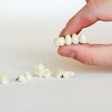
The state of New York could save $50 million and improve young children's oral health by educating parents about early childhood caries (ECC), according to a new study with national and practice implications.
Early childhood caries accounts for a disproportionate share of dental expenditures in Medicaid and the Children's Health Insurance Program, according to the report authors. Current treatment options repair caries damage but do not target the underlying causes of disease.
Researchers modeled how alternative caries control strategies in New York may impact the state's net cost and percentage of young children with ECC over a 10-year period. Their report, which is published in the current Journal of the American Dental Association, specifically focused on children younger than age 6 who are enrolled in New York's Medicaid system (JADA, April 2015, Vol. 146:4, pp. 224-232).
“Interventions that begin early in children's lives or that affect early stages of caries development anticipate greater disease reductions compared with [the] baseline.”
The researchers analyzed nine alternative intervention strategies, including community water fluoridation (CWF) and motivational interviewing, to discover if they could effectively reduce the percentage of children with caries. They examined projected outcomes, costs, and net savings to the state over a 10-year period.
The researchers found that intervention strategies that empowered families and targeted the youngest children are projected to be the most effective at decreasing the number of children with early childhood caries.
"Overall ... interventions that begin early in children's lives or that affect early stages of caries development anticipate greater disease reductions compared with [the] baseline than do interventions that target the children at the highest risk," wrote lead author Burton Edelstein, DDS, MPH, and colleagues. Dr. Edelstein is a professor of dental medicine and health policy and management at Columbia University Medical Center in New York City and the founder of the Children's Dental Health Project (CDHP, as well as a senior fellow in public policy for the organization.
Dramatically reduce caries by targeting new parents
Specifically, the researchers found that motivational interviewing is projected to have one of the greatest percentages of caries reduction, while also saving the state the most money. Motivational interviewing is a form of counseling in which one party motivates another to achieve a goal through conversation. In the case of dental care, it can be done by nonprofessional healthcare workers, making the strategy less expensive than other forms of intervention.
By starting motivational interviewing when children are 6 months old, the state could see a 45% decrease in caries compared with the baseline and save almost $50 million over the course of a decade. Early action is key, however, and, instead of saving money, the state could lose almost $24 million by waiting until children are 2 years old to start the intervention, the study authors noted.
The researchers also found that combining motivational interviewing with reduced cariogenic flora transmission in children up to 2 years old could decrease the percentage of children with caries by nearly two-thirds, the greatest reduction rate of all the analyzed strategies. However, this combination strategy is also projected to be the most expensive, costing more than $25 million to enact.
"[Motivational interviewing] and counseling mothers and caregivers in limiting the transmission of cariogenic flora both result in improvements across all four outcome measures," the authors wrote.
| Savings due to caries reduction strategies | ||
| Intervention strategy | Reduction in caries compared with baseline | Net savings |
| Motivational interviewing | ||
| At 6 months, 63% assumed cavity reduction | 45% | $49.25 million |
| At 2 years, 63% assumed cavity reduction | 20.5% | -$23.96 million |
| At 6 months, 46.5% assumed cavity reduction | 32.2% | $16.93 million |
| At 6 months, 38.3% assumed cavity reduction | 26% | $322,000 |
| At 6 months, only to high-risk children, 46.5% assumed cavity reduction | 5.5% | $16.23 million |
| Motivational interviewing with reduced cariogenic flora transmission | ||
| Between birth and 2 years, assumed 64% cavity reduction | 66.7% | -$25.19 million |
Report confirms the importance of fluoridated water
In the same study of New York children younger than 6 enrolled in Medicaid, the researchers evaluated how adding and removing fluoride from the state's water could impact caries rates and associated Medicaid costs. New York City already has fluoridated water, and if the rest of the state followed, it could reduce caries in young children by 3.3% and save nearly $11 million over a decade.
"Among fluoride-based intervention, the lowest unit cost and most passive intervention, CWF holds the greatest promise for both disease reduction and cost savings while equitably reaching all young children receiving Medicaid," the authors wrote.
If New York City alone were to remove fluoridation from its water supply, it could lead to a 13.6% increase in the number of children with caries over a 10-year time frame. Doing so would also cost the state an additional $54 million in Medicaid dental expenses for children younger than 6.
"System dynamics help anticipate that defluoridating the NYC water supply would increase reparative dentistry costs by $55.9 million for young children receiving Medicaid alone," they wrote. "The overall effect would be far greater, given that CWF additionally benefits young children in families above Medicaid eligibility as well as the entire state's residents across their life spans."
The researchers emphasized that their report only evaluated a small population, and the effects of some of the proposed intervention strategies could have more benefits than projected. They concluded that older children and children from higher-income families might also benefit from these strategies.



















